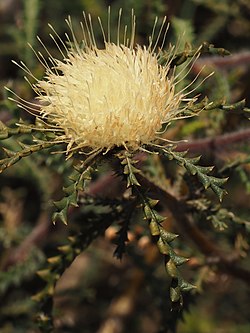Biology:Banksia echinata
| Banksia echinata | |
|---|---|

| |
| Scientific classification | |
| Kingdom: | Plantae |
| Clade: | Tracheophytes |
| Clade: | Angiosperms |
| Clade: | Eudicots |
| Order: | Proteales |
| Family: | Proteaceae |
| Genus: | Banksia |
| Subgenus: | Banksia subg. Banksia |
| Series: | Banksia ser. Dryandra |
| Species: | B. echinata
|
| Binomial name | |
| Banksia echinata (A.S.George) A.R.Mast & K.R.Thiele[1]
| |
| Synonyms[1] | |
|
Dryandra echinata A.S.George | |
Banksia echinata is a species of shrub that is endemic to Western Australia. It has serrated leaves with nine to twenty-five sharply pointed, triangular teeth on each side, heads of about fifty pale yellow flowers and sparsely hairy follicles.
Description
Banksia echinata is a shrub that typically grows to a height of 0.6–3 m (2 ft 0 in–9 ft 10 in) but does not form a lignotuber. It has serrated linear leaves that are 30–150 mm (1.2–5.9 in) long and 6–15 mm (0.24–0.59 in) wide with between nine and twenty-five sharply pointed, triangular teeth on each side. The flowers are borne on a head of between 45 and 55 flowers with narrow lance-shaped involucral bracts up to 10 mm (0.39 in) long at the base of the head. The flowers are pale yellow and have a perianth 17–23 mm (0.67–0.91 in) long and a pistil 22–26 mm (0.87–1.02 in) long. Flowering occurs from July to October and the fruit is a sparsely hairy follicle 6–9 mm (0.24–0.35 in) long.[2][3][4]
Taxonomy and naming
This banksia was first formally described in 1996 by Alex George in the journal Nuytsia and given the name Dryandra echinata from specimens he collected near the Brand Highway and Moore River National Park in 1986.[2][5] In 2007, Austin Mast and Kevin Thiele transferred all the dryandras to the genus Banksia and this species became Banksia echinata.[6][7] The specific epithet (echinata) is a Latin word meaning "armed with many prickles", referring to the teeth on the leaves.[2]
Distribution and habitat
Banksia echinata grows in kwongan and open woodland between Regans Ford, New Norcia and Gingin in the Avon Wheatbelt, Geraldton Sandplains, Jarrah Forest and Swan Coastal Plain biogeographic regions.[2][4]
Conservation status
This banksia is classified as "not threatened" by the Government of Western Australia Department of Parks and Wildlife.[4]
References
- ↑ 1.0 1.1 "Banksia echinata". https://biodiversity.org.au/nsl/services/apc-format/display/205112.
- ↑ 2.0 2.1 2.2 2.3 George, Alex S. (1996). "New taxa and a new infrageneric classification in Dryandra R.Br.". Nuytsia 10 (3): 339–340.
- ↑ George, Alex S. (1999). Flora of Australia. 17B. Canberra: Australian Biological Resources Study, Canberra. pp. 227–228. https://www.environment.gov.au/system/files/pages/6d8c5c3b-8545-437e-b9b3-944ac95ee07a/files/flora-australia-17b-proteaceae-3-hakea-dryandra.pdf. Retrieved 23 April 2020.
- ↑ 4.0 4.1 4.2 "Banksia echinata". FloraBase. Western Australian Government Department of Parks and Wildlife. https://florabase.dpaw.wa.gov.au/browse/profile/32556.
- ↑ "Dryandra echinata". APNI. https://id.biodiversity.org.au/instance/apni/559016.
- ↑ "Banksia echinata". APNI. https://id.biodiversity.org.au/instance/apni/614261.
- ↑ Mast, Austin R.; Thiele, Kevin (2013). "The transfer of Dryandra R.Br. to Banksia L.f. (Proteaceae)". Australian Systematic Botany 20 (1): 63–71. doi:10.1071/SB06016.
Wikidata ☰ Q4856594 entry
 |


